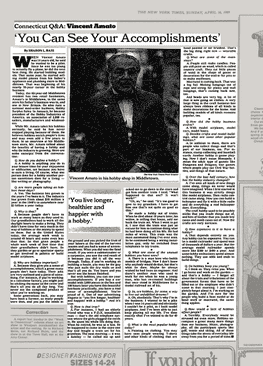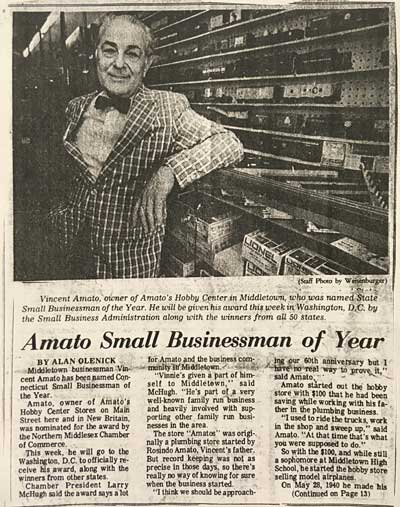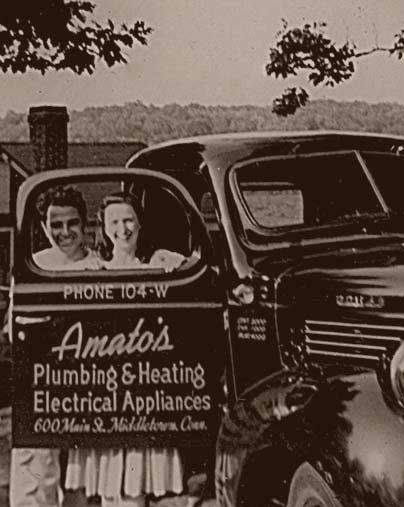Welcome To Amato’s Toy And Hobby
Visit Our Stores In Middletown & New Britain CT
Amatos Middletown : 395 Main Street Middletown Connecticut. Located right in the center of downtown. Minutes from I-91, Rt. 9 or 66.
Amatos New Britain : 283 Main Street, New Britain Connecticut. Located a block from the central square. Minutes from Rt. 9 north or south.
Our History
When Vincent Amato was 14 years old, he said he wanted to be a pilot. Since he was too young to actually fly a plane, he did the next best thing. He started building models. That same year, he started selling model planes from his father’s appliance and plumbing store in Middletown. That was beginning of his over 70-year career in the hobby business.
1989 New York Times Interview

Read full text of New York Times 1989 interview of Vincent Amato below.
1989 New York Times Interview
Vincent Amato: “You Can See Your Accomplishments”
I got started in my business in the ’30s. I was born in 1925, and by the middle ’30s I was 12 or 13 years old and our heroes in those days were pilots like Lindberg and the others who did air racing and that kind of stuff, not like the orange-haired basketball players who are 8 feet tall and make millions of dollars,” White writes.
“So, like a lot of other kids, I built model airplanes, the kind you put together with paper and string and wood,” White quotes Amato as saying.
In the area now called Riverview Center, there was Center Street. The plaque is there by the police department.
“A little store was run by Arthur Warmsley, photographer, and a friend of his that was a model airplane guy. The two of them had this store where they sold model airplanes and photographic supplies. They closed the store up when World War Two was eminent and so there was no place to buy model airplanes,” White writes.
Amato saved up $150 and asked his father, who had a plumbing and heating business in the building now occupied by Shlein’s Furniture at 584 Main Street, if he could run a shop. Amato registered the name “Amato’s Hobby Center” with City Hall.
WHEN Vincent Amato was 14 years old, he said he wanted to be a pilot. Since he was too young to actually fly a plane, he did the next best thing. He started building models. That same year, he started selling model planes from his father’s appliance and plumbing store in Middletown. That was beginning of his nearly 50-year career in the hobby business.
Today, the 63-year-old Middletown resident has two retail businesses, Amato’s in Middletown, in the same store his father’s business was in, and one in New Britain. He also runs a national mail-order business, Hobby Surplus Sales. In January, he became president of the Hobby Industries of America, an association of 3,000 retailers, manufacturers and wholesalers.
While Mr. Amato takes his hobbies seriously, he said he has never stopped playing because of them. He believes hobbies enrich people’s lives and may even add a few years to them. In an interview at his Middletown store, Mr. Amato talked about the benefits of having a hobby and why the industry is growing. Here are some excerpts from the conversation:
Q. How do you define a hobby?
A. A hobby is anything you do in your leisure time for your enjoyment or edification, not because you have to earn a living. Of course, what one person does for a hobby another person sometimes does for a living – like writing or photography.
Q. Are more people taking on hobbies these days?
A. Yes. The business has grown in the years I’ve been in it. The industry has grown from about $10 million a year in the 1940’s to somewhere near $3 billion a year today.
Q. Why is that?
A. Because people don’t have to work as many hours as they used to.
Our grandfathers had to work all the daylight hours to make a living. They didn’t have time for very much in the way of hobbies or the money to spend on them. But in the United States today, the average work week is around 40 hours and some even less than that. So that gives people a whole work week of free time that their grandfathers didn’t have. So they garden or go to spectator sports or get involved in politics or build model airplanes.
Q. Why are hobbies important?
A. Because they give you a sense of accomplishment, which a great many people don’t have today. Their jobs are very outlined and a piece of something. For instance, if you’re working in a calculator factory, you might just be sticking the name on the cover and that’s all you do all day long. You never see the completed product of what you’re working on.
Some generations back, you may have been a farmer, as many people were then, and you put the seeds in the ground and you picked the fruit of your labors at the end of the harvest season and you had a sense of accomplishment. What you did was the final result. If you were a cabinetmaker or a carpenter, you saw the end result of it because you did it all the way through. Today, if you’re working on building a house, you may be the guy who just nails the dry walls on and that’s all you do. You leave and you never see the house finished.
But with hobbies, you can see your accomplishments. If you buy a car model with 2,000 pieces in the box and 100 hours later you have this beautiful heirloom practically, you have a real sense of accomplishment. You’re proud of it. One of our advertising slogans is ”you live longer, healthier and happier with a hobby.” And it’s true.
Q. How is that true?
A. For instance, I had an elderly friend who was a P.D.X. installation man – that’s the old telephone system where the girls plugged the cords in. He spent his whole life doing that. When he retired, he was at a loss. So he happened to come in the store one day and bought a train set for his grandson. The next morning – it was a Sunday – he called me up and asked me to go down to the store and get him another train. I said, ”What happened to that one? It won’t work?”
”Oh, no,” he said. ”It’s too good to give to my grandson. I have to get him one that’s not quite as good as this.”
He made a hobby out of trains. When he died about 10 years later, his widow, in selling that house, sold me back the train set. When I went to get it, I saw that the train was just an excuse for him to continue doing what he had been doing all his life. He had miles of wires. This train was the most automated thing I’ve ever seen. So he continued being a wiring installation guy, only he switched from telephones to toy trains.
Q. What are some of the unusual hobbies you have seen?
A. There is a man here who builds models of bridges. Now I don’t know why anybody would do that, but that’s what he does. Maybe he always wished he had been an engineer. And there’s another man who used to work for me when he was a young man, who has re-created buildings that once stood in Middletown for a model railroad set of his.
Q. So are hobbies, for some, a way to live out unfulfilled dreams?
A. Oh, absolutely. That’s why I’m in the business. I wanted to be a pilot when I was 14 years old and obviously I couldn’t be a pilot, so I built model airplanes. And I’ve been able to just keep playing all my life. I’ve done exactly what I’ve wanted to do for 49 years.
Q. What is the most popular hobby today?
A. Painting on clothing. You may have seen people wearing T-shirts and other kinds of clothing that are hand painted or air brushed. That’s the big thing right now – wearable crafts.
Q. What are some of the mainstays?
A. People still make candles. People still paint on wood, which is called country craft. They cut little pieces of wood in the shape of geese or decorations for the wall or for pins or to make mailboxes.
Macrame is coming back. That was a big fad. Making hangings out of rope and string for plants and wall hangings, that’s coming back now, too.
And beads are very big. A lot of that is now going on clothes. A very large thing in the craft business has always been ribbons of all kinds to make decorations for the home. And building models of all kinds remains popular, too.
Q. How did the hobby business evolve?
A. With model airplanes, model cars, model boats.
Q. Besides crafts and model buildings, what are some other popular hobbies?
A. In addition to those, there are people who collect things and that’s part of our business, too. For instance, stamp collecting and baseball cards. Another hobby is game playing. Now I don’t mean Monopoly. I mean the adult type of games like Dungeons and Dragons, war games where people play out Civil War battles, and things of that nature.
Q. Over the last half century, how has the hobby industry changed?
A. I’ve seen all kinds of new things come along, things we never would have imagined. When I first started in this business it was strictly things like model airplanes. Then radio control came along. Now you can build a helicopter and fly it with a little radio and do everything a real helicopter does. Everything.
The craft hobby used to be possibly sticks that you made things out of, and kits of leather that you made key cases and comb cases out of. Now the crafts are very intricate.
Q. How expensive is it to have a hobby?
A. That depends entirely on you. Any hobby can be expensive. You can be a model railroader and spend tens of thousands of dollars a year. But the average model railroader spends more like $300 or $400 a year. And some hobby enthusiasts spend almost nothing. They use odds and ends to build things.
Q. Do hobbies keep you young?
A. I think so. They relax you. When I go home and work on the garden – and that’s a hobby – I forget all about the trials and tribulations of the government forms that have to be filled out or the employee who didn’t come in that morning. I just completely forget about it. I’m working on the garden. And I’m sure for the people who build a boat model or do bead work or macrame, the same thing applies.
Q. How would a lack of hobbies affect people?
A. Terribly. Everybody would be stressed out even more. Hobbies encompass a great many more things than my business. Music, photography, all the participant sports like golf, tennis and skiing. All of those things take the stress of everyday life away from you for a period of time.
A version of this article appears in print on April 16, 1989, Section CN, Page 12 of the National edition with the headline: CONNECTICUT Q & A: VINCENT AMATO; ‘You Can See Your Accomplishments’.


